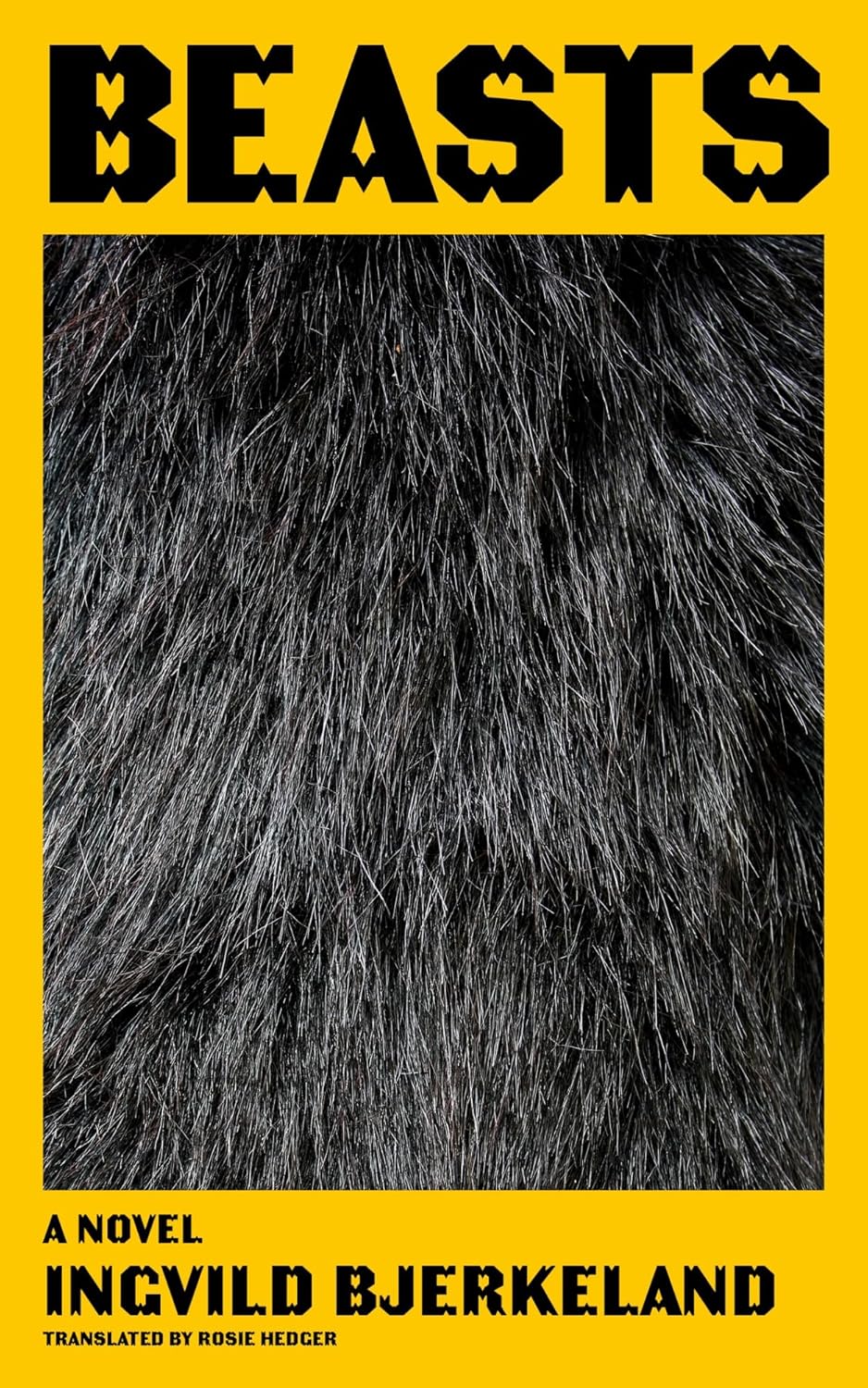Beasts
- By Ingvild Bjerkeland; translated by Rosie Hedger
- Levine Querido
- 128 pp.
- Reviewed by Priyanka Champaneri
- April 18, 2025
Norwegian siblings flee creatures that have precipitated society’s collapse.

Two children, alone and lost, hungry and tired, wander a deep wood. Fleeing a terrible evil, they come upon a yellow house that seems to have all that they need. They settle in, unaware another danger follows close behind.
And so begins Ingvild Bjerkeland’s Beasts, a middle-grade novel that starts off in the tradition of a fairytale but quickly veers into something darker.
Set in Norway, the slim novel opens with 13-year-old Abdi and his 5-year-old sister, Alva, already on the run after their mother’s murder by the titular monsters. They’re headed for the Shetland Islands, where their father is stranded on a research mission, a place they and others hope will be safe from the evil they’re trying to escape.
And what an evil it is: Bjerkeland doesn’t make the reader wait long before we see the black-furred beasts, with their upright posture, hoofed legs, and claws that unfurl into knives. As we learn in flashbacks, the arrival of these creatures, who murder all they see, precedes society’s collapse.
Bjerkeland has written numerous books in her native Norwegian, but Beasts is her first to be translated into English. Rosie Hedger’s rendering is crisp and spare, the lines lean as picked-clean bones. When Abdi, who narrates the story, has a rare moment for processing his emotions, the language turns vivid:
“The fear was like an enormous black bird within me. It beat its wings in panic.”
There are deeper themes here, as well, such as the line that separates not only child from adult but man from beast — and whether, once crossed, one can ever go back again. The most poignant moments come when Abdi laments not just the loss of his childhood but the loss of adults:
“I missed grownups. Mom, Dad, my teacher, the mailman. Literally anyone. If only someone, somewhere could tell me what to do.”
This, despite the failure of those same grownups. The details of society’s breakdown are made more depressing for their predictability — grocery stores ransacked, nursing homes terrorized in the mad search for prescription drugs, and savior braggarts with guns who crumple at the first test of their mettle. “Selfishness spreads like wildfire,” Bjerkeland writes, and it’s not long before even kids can see that the adults in charge are as helpless as they are.
This can be heavy stuff, especially for a younger reader, but Bjerkeland deftly balances that weight with moments of real joy and lightness. Life before the beasts is shown in flashbacks where the children are safe at home and able to be just that — children.
The siblings anchor the book, and their emotional journey is as riveting as the physical one. Small and feisty Alva brings much-needed levity to scenes where she chatters away at top speed or proclaims she will never eat sushi, no matter how starved she is. She is also Abdi’s guiding star. “Alva was my responsibility now,” he says. “I had to look after her; I had to make sure she had whatever she needed to survive.”
Through that responsibility, Abdi overcomes his fears, finds courage, and reorients himself when self-doubt clouds his thoughts. With no grownups around to encourage or praise him, he finds strength within himself:
“The fear within me had neatly folded back its wings and tucked them in, at rest…A silent peal of laughter seemed to pulse through me: I could do this.”
Bjerkeland walks a careful line between being mindful of her audience’s age while refusing to shrink from the truth. Filled with tension and a few heart-pounding moments, Beasts never fully strays into the darker recesses like its postapocalyptic adult cousins The Road or I Who Have Never Known Men, yet it also resists easy answers or a storybook ending.
It’s a balance that clearly works: The author’s biography notes that 10,000 schoolchildren chose the novel for Norway’s top bookseller’s prize. With its propulsive prose and its central siblings whose survival is powered by empathy, Beasts is likely to garner praise from far more readers than that in the United States and beyond.
Priyanka Champaneri is the author of the novel The City of Good Death.
